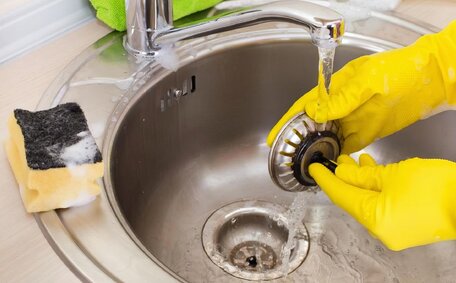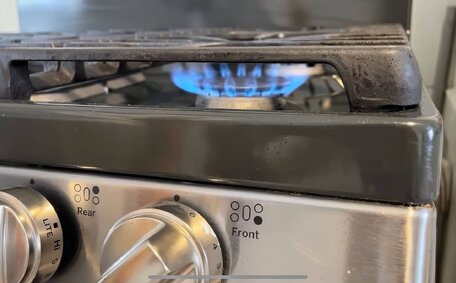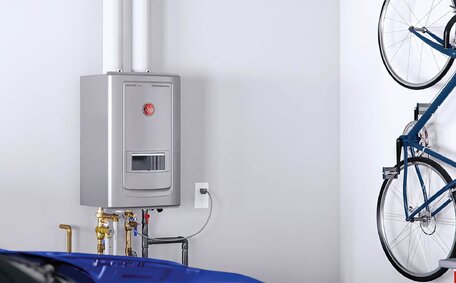The risks of chemical drain cleaners
Liquid drain cleaners can pose serious risks to your health and could damage your home. They contain harsh chemicals which can cause harm, and if used improperly, can also damage surfaces like your sink.
These acidic cleaners are corrosive and can eat away at pipes, joints, sinks, and drains made of metal or plastic over repeated use. These acidic cleaners are corrosive and can eat away at pipes, joints, sinks, and drains made of metal or plastic over repeated use.
The reaction created breaks down clogs while also releasing toxic chemical fumes. The environment also suffers when the chemicals make their way into wastewater supplies or soil.
Consumers should understand these risks before deciding on using chemical cleaners on clogged drains. Make sure to don gloves and safety goggles when using, operate in a ventilated space, keep products singular, introduce water before the rest, and reflect on safer methods like mechanical drain snakes or boiling water to flush out your drains.
Common hazardous ingredients in chemical drain cleaners
Chemical drain cleaners contain potent ingredients like sulfuric acid, sodium hydroxide (lye), hydrochloric acid, and bleach, which can be dangerous if mishandled.
Sulfuric acid is an extremely corrosive acid that can cause severe burns. It reacts with water to produce heat, which helps break down materials clogging the drain. However, this vigorous chemical reaction can cause damage to your respiratory system due to the release of toxic fumes.
Sodium hydroxide, also known as lye or caustic soda, is another powerful chemical that dissolves organic matter. But it can also cause damage to your plumbing system over time.
Hydrochloric acid, sometimes called muriatic acid, is another corrosive chemical commonly added to drain cleaners. It produces chlorine gas which can damage lungs and pipes.
Bleach breaks down enzymes and proteins. But mixing bleach with other substances can create toxic chlorine gas. It can also damage metal pipes.
These chemicals pose risks of burns, blindness, lung damage and even death in rare cases if swallowed or inhaled. Their fumes and residues are among the reasons why they should not make contact with skin eyes, or any other sensitive areas of the body. Why should consumers use chemical drain solutions with caution? It’s because they contain these caustic substances that demand safety precautions.
Health and safety hazards
Drain cleaners work to get rid of blockages but come with significant health and safety hazards that require caution from consumers. The corrosive ingredients can cause severe chemical burns if they come into contact with skin or eyes. Inhalation of the toxic fumes chemicals can emit can lead to lung irritation and respiratory distress if experienced in high concentrations without appropriate ventilation.
Accidentally ingesting chemical drain cleaners also poses an extreme risk of internal burns, throat swelling, and major organ damage. In such dire scenarios, it’s important to seek emergency assistance for your own safety by calling poison control or 911 without delay. Ensure cleaners are stored safely and away from children pets to prevent accidental mishaps.
It’s also critical to wear safety gear like rubber gloves, safety goggles, masks, and long sleeves when handling these caustic products to minimise risks. Carefully review all warning labels before using any chemical cleaning products and never mix them with other cleaners to avoid dangerous chemical reactions that release chlorine or sulphur dioxide gas.
Overall, The hazards posed by using liquid drain cleaners improperly are considerable, which is why opting for home improvement solutions can be beneficial. Drain cleaners do accomplish clearage effectively, However, safer methods such as mechanical drain snakes, boiling water, baking soda and vinegar can just as effectively achieve this without jeopardising health or your plumbing system.
Environmental impact
Many people don’t realise that using drain cleaners that make their way into the environment can have disastrous effects. When flushed down drains, the harsh ingredients can contaminate not just water supplies and groundwater, but also your septic tank and soil.
Sulfuric acid, sodium hydroxide, and other caustic chemicals not only alter the pH balance of ecosystems but can be detrimental to your plumbing. They introduce toxins that can kill microorganisms, plants, and aquatic life. Wildlife is also notably impacted when exposed to residues from drain cleaners your household may have used.
These chemicals don’t simply disappear after use. They persist in the environment and accumulate when comes the time for them to break down naturally. These chemicals don’t simply disappear after use.
One study highlighted significant ecological impact when it comes to liquid drain cleaner, showing reduced biodiversity in streams by up to 40%.
That’s why it’s critical to consider the long-term consequences before you decide to use chemical drain cleaners. Safer methods like Mechanical snakes, boiling water, or baking soda vinegar mixtures can used to breakdown clogs without causing ecological harm. If you must use commercial drain cleaners, follow directions carefully and never pour leftovers down the drain.
Pipe and plumbing damage
Chemical-based drain cleaners can severely damage pipes and plumbing systems. Older pipes, including PVC, plastic, and metal, are particularly vulnerable to corrosion over repeated exposure to these caustic products.
Ingredients like sulfuric acid and sodium hydroxide can exacerbate issues where clogs your pipes, eating away at the smooth surfaces inside. Over time, small pits and cracks may end up compromising your pipe’s integrity, as waste, bacteria and tree roots accumulate leading to further clogs or leaks. Joints and seals can also deteriorate.
The combination of chemicals plus heat and pressure can clear clog formations in a drain but can be so intense they’re known to melt plastic PVC pipes. Metal pipes face corrosion, weakening to the point of collapse or rupture.
To avoid expensive plumbing repairs, consumers should use drain cleaners with caution or opt for less harmful alternatives and let products fully dissipate before flushing pipes with plenty of cold water. Consider physically removing clogs with snakes or embracing natural drain cleaning methods instead.
Safer alternative cleaning solutions
There are safer methods for unclogging drains that demonstrate drain cleaners safe for your plumbing. Effective home remedies for drain clearing clogged drains to consider include:
- Boiling water - Pouring a pot of boiling water down your drain can work as a natural drain cleaner to dissolve grease and loosen a blocked drain. Flush your drain with cold water after pouring boiling water down drain.
- Vinegar baking soda - A mixture of half cup baking soda with half cup vinegar, followed with boiling water down the drain, becomes a potent natural remedy for stubborn blockages. Let sit 15 minutes then rinse with hot water.
- Mechanical drain snake - Carefully insert this bendable tool into the drain to manually pull out hair and Debris so that water, once hindered by the lye caustic buildup, can flow freely again.
- Dish soap and hot water - Try pouring extremely hot water mixed with a grease-fighting liquid dish soap or detergent directly into the drain as an initial treatment.
These methods can turn into drain cleaners that break up blockages without endangering health or compromising the integrity of your drainage system. They help keep your drain pipes clear without further contamination compared to commercial chemical solutions. However for severe clogs, hiring a professional plumber may be required.
When to call a professional plumber
Calling a professional drain specialist is advisable when chemical drain cleaners fail to resolve clogging issues or when extensive plumbing repairs are needed.
Plumbers have specialised equipment that can get into your drains like industrial-strength drain snakes to remove stubborn obstructions mechanically. They can help much more effectively by using pressurised water jets, suction cups, or tiny cameras to inspect drains, septic tank systems, and pinpoint trouble spots. Their expertise brings more than solutions to manage trickier clog situations and serious septic system damage, ensuring safe use of specific methods.
Signs it’s time to call the professionals at Pennant Hills Plumbing include:
- Chemical drain cleaners haven’t worked
- Clogs reoccur frequently
- You have a major sewer line clog
- Multiple drains are blocked simultaneously
- Your pipes are making strange noises
- You notice leaks, cracks or corrosion
- Your bathroom fixtures drain slowly
Don’t hesitate to email us or call 1300 555 1234 to schedule an appointment if you face any of these issues. We have the tools and know-how to diagnose and resolve drain problems safely, minimising health hazards and future plumbing repairs.
Conclusion and summary
It’s important to consider how chemical drain cleaning products work; they may promise a quick fix but pose substantial safety and environmental risks that consumers should weigh carefully. Their corrosive ingredients – like sulfuric acid, sodium hydroxide and bleach – can cause severe burns, release toxic fumes, and damage plastic or metal pipes over time.
Safer physical and natural drain cleaning solutions like boiling water, vinegar baking soda, or mechanical snakes avoid these hazards while still effectively clearing minor clogs. To learn more about dealing with stubborn blockages or serious pipe repairs, trust the expertise of professional plumbers like Pennant Hills Plumbing.
Residue from using liquid cleaners persists in ecosystems – contaminating water and soil, harming wildlife. Consumers must consider these lasting environmental impacts too. Ultimately, the healthiest course is embracing preventative measures – minimising grease and hair sent down drains while occasionally flushing pipes to clear debris before major obstructions form.
For any remaining plumbing issues, email or call Pennant Hills Plumbing to schedule assistance. Our team brings extensive knowledge plus the latest tools and methods for clearing drains safely, resolving problematic clogging and leaks fast.






